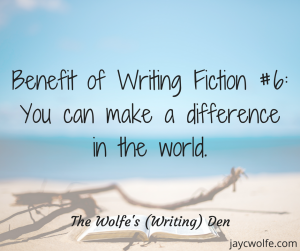What If? Writing Prompts: History VII
This past week saw yet another anniversary of the September 11 attacks as well as the destruction left in the wake of a record-breaking hurricane sweeping the Atlantic, the second to hit the U.S. in less than two weeks. Remembering watching the news in school 16 years ago and wondering how much more devastating the effects of climate change can become have gotten me thinking a lot about the past and future of our world, so this week I was inspired to share another set of “What If?” Writing Prompts in the theme of history. What sorts of stories about historical events can you create from these ideas? Good luck!
 What if… global political leaders had started working to address climate change decades sooner?
What if… global political leaders had started working to address climate change decades sooner?
What if… the terrorist attacks of September 11, 2001, had never happened?
What if… America had never started the Iraq War?
What if… Europe hadn’t begun to form what would eventually become the European Union after World War II?
What if… the Founding Fathers had established America as a direct democracy instead of an electoral college?
Enjoy writing more stories about history!
If you have any “What If?” writing prompt suggestions (for any theme), please feel free to share them in the comments below. Ideas I like may be featured in future “What If?” posts, with full credit and a link to your blog (if you have one)! Also, if you’ve written a piece based on an idea you’ve found here, be sure to link back to the respective “What If?” post. I would love to see what you’ve done with the prompt! Thank you!
Word of the Week: Hegemony
Word: hegemony
Pronunciation: hə-JE-mə-nee / HE-jə-moh-nee
Part of Speech: noun
Definition: leadership or dominance, especially by one country or social group over others
Source: Oxford Dictionaries
So funny story: the other day I stumbled upon a reminder to write a Word of the Week entry for today’s vocabulary word, but I neglected to add a note about where I first learned it. I want to say it’s another word I picked up from a game in the Elevate – Brain Training app, but it could just as easily have come from a recent political article. In any case, if it isn’t the latter, it very well could be soon; I wouldn’t be surprised if shifting perceptions of “hegemony” became the next hot topic of debate!
“Hegemony” is a form of dominance or leadership, typically of a state or social group over others. The word arose in the mid 16th century and comes from the Greek noun hēgemonía, meaning “leadership”. This noun stems from the noun hēgemṓn “leader”, which in turn derives from the verb hēgéomai “to lead”.
While “hegemony” refers specifically to political states or groups in formal contexts, it can just as frequently refer to the dominance of a certain social group over another, though it’s worth noting that this form of rule stipulates a level of consent from the subordinate group as opposed to dominance by pure force. If you want to expand this word’s use, you can also use the related noun “hegemon”, meaning “a supreme leader”. If your characters are divided into dominant and submissive groups on any scale, “hegemony” may be a good word to use in your stories!
What are your thoughts on this word? Any suggestions for future “Word of the Week” featured words?
Waiting to Soar (Colleen’s Weekly Poetry Challenge #49)
The wind on my face
Sings adventure and freedom
Yet the fall is great
Still, life will not wait for me
So I spread my wings and soar
My response to Colleen Chesebro‘s Weekly Poetry Challenge #49: Soar & Wait. The form I chose for my first entry is the tanka. I hope you enjoy the poem! Thanks for the prompt, Colleen!
The Perks of Being a Fiction Writer
Remember that post I shared last week about the hard truths of being a writer? Well, fear not; I promise you that was only half of the big picture. After all, why would anyone choose to write if it only ever brought misery? Being a writer can be just as rewarding as it is frustrating, and if you can power through its challenges, you’ll find an incredibly adventurous and fulfilling path ahead.
So for those of you who choose to follow this path, here are six perks of being a fiction writer that you can look forward to. Happy writing!

Writing Perk #1: You have the power to create anything.
 In a way, fiction writers make up their own class of superheroes. Some people have super strength, others are incredibly smart, and still others excel at almost everything they try. But writers? We have the ultimate gift: the power of creation.
In a way, fiction writers make up their own class of superheroes. Some people have super strength, others are incredibly smart, and still others excel at almost everything they try. But writers? We have the ultimate gift: the power of creation.
While I envy visual artists for their ability to draw, I’d still favor being a writer any day. The ability to paint vivid images with language is a special form of art with its own challenges, and when done right, it can be even more effective. A picture may be worth a thousand words, but imagery through words alone is an exercise for the imagination.
Anyone who’s ever tried writing a novel—especially a fantasy or science fiction novel—is familiar with the concept of “world building”. There’s much more to storytelling than conflict; you must create characters and settings to bring that conflict to life. And in my experience, there’s nothing quite as thrilling as the power to create an entire universe and direct the fates of its inhabitants any way you want. Besides, at what other job can you openly say you kill people for a living? Writing may not be the highest paying job in the world, but it certainly has benefits you can’t get anywhere else!
Writing Perk #2: You regularly exercise your mind and imagination.
 There’s nothing like writing a story to get those creative juices flowing. It’s no secret that writing has several psychological benefits such as catharsis and improved learning, and writing fiction has the added benefit of exercising the imagination. Creativity is always a useful skill, so you can never have too much of it!
There’s nothing like writing a story to get those creative juices flowing. It’s no secret that writing has several psychological benefits such as catharsis and improved learning, and writing fiction has the added benefit of exercising the imagination. Creativity is always a useful skill, so you can never have too much of it!
By regularly creating characters, settings, and plots, you exercise the ability to see situations from various perspectives and open your mind to all sorts of possibilities, as much in fiction as in real life. Practice with conflict resolution in fiction can also be surprisingly helpful when it comes to real-world problem-solving, as you’ll likely be able to foresee problems more easily and find better solutions. And if not, at least you’ll have another story to tell when everything’s said and done. Writing fiction provides plenty of benefits for your mind and spirit. Don’t let them go to waste!
Writing Perk #3: You have the best emotional release in the world.
 There’s a saying that goes, “Never wrong a writer. They get their revenge in print.” There’s another saying that goes, “If a writer falls in love with you, you can never die.” What do these sayings have in common? They prove that writers have the most powerful emotions in the world.
There’s a saying that goes, “Never wrong a writer. They get their revenge in print.” There’s another saying that goes, “If a writer falls in love with you, you can never die.” What do these sayings have in common? They prove that writers have the most powerful emotions in the world.
Being a writer, especially a fiction writer, takes a generous amount of vulnerability to pull off. Good fiction demands a fair share of emotion to resonate with the audience, and that means the writer must be an emotional being. We bleed our feelings onto the page and carefully craft our stories to evoke the empathy of our readers, and such an art form takes inspiration from real-life emotions. Fortunately, life provides emotional inspiration in spades.
As a writer, you should never be afraid to use your emotions in your work. When you’re happy, write motivational pieces with positive takeaways. If you fall in love, draw romantic stories or poetry from personal experience. Use a broken heart as the foundation of tragedies, and when someone infuriates you, adapt them into an expendable character and kill them off in the most satisfyingly painful way. In how many other jobs can you say your emotions are your most powerful tools? Use them to your advantage!
Writing Perk #4: You learn new things all the time.
 Think of the last time you wrote a story about something you’ve never done before. Chances are you had to do a fair amount of research to get it right, and you probably learned something unexpected while you did. This is one of the most enjoyable parts of writing fiction: you learn something new every day!
Think of the last time you wrote a story about something you’ve never done before. Chances are you had to do a fair amount of research to get it right, and you probably learned something unexpected while you did. This is one of the most enjoyable parts of writing fiction: you learn something new every day!
Whether you write fantasy/sci-fi novels, historical fiction, or anything in between, at some point during writing, you’ll run into a detail that you’ll have to look up. While research can be tedious sometimes, you can also see it as an opportunity to learn something you never would have otherwise. From ancient mythology to medieval weaponry to space technology, the world is full of fascinating information just waiting to be turned into stories. With all the research it takes to be a fiction writer, we probably learn more doing what we do than all the other professionals out there combined!
Writing Perk #5: You get rewarded for being yourself.
 Let’s be honest: the absolute best writing always comes from the heart, and the only way to write from the heart is to be yourself. Hiding behind a mask of civility may get you ahead in the corporate world, but when it comes to writing fiction, imperfection is your greatest asset. No matter what genre you write in, it’s your original voice that will make it unique. You don’t have to be completely crazy (though eccentricity is definitely a plus); you just have to be relatable. And if you’re flawed—or in other words, human—you’ve already got that covered.
Let’s be honest: the absolute best writing always comes from the heart, and the only way to write from the heart is to be yourself. Hiding behind a mask of civility may get you ahead in the corporate world, but when it comes to writing fiction, imperfection is your greatest asset. No matter what genre you write in, it’s your original voice that will make it unique. You don’t have to be completely crazy (though eccentricity is definitely a plus); you just have to be relatable. And if you’re flawed—or in other words, human—you’ve already got that covered.
One of the most famous writing tips out there is “write what you know”, so when drawing inspiration from people for characters, the best person to start with is yourself. You know your own strengths and weaknesses, so you already have what it takes to create a well-rounded character. From there, work your way up to using other real people as inspiration for characters, and before you know it, you’ll be writing dozens of stories that readers will easily relate to.
Basically, if you’re only writing perfect characters who never deal with conflict in any way, you’re doing fiction wrong. Everyone has their flaws and problems, and if you can be open about yours, you can create meaningful and inspiring works of art, just by being yourself. How is that not the greatest job in the world?
Writing Perk #6: You can make a difference in the world.
 There are few forms of writing that make an impact quite the way storytelling does. While nonfiction generally focuses on logic and rational thought, stories have the power to mix truth with emotion in a unique style that appeals to a reader’s entire character, thus making for much more influential writing.
There are few forms of writing that make an impact quite the way storytelling does. While nonfiction generally focuses on logic and rational thought, stories have the power to mix truth with emotion in a unique style that appeals to a reader’s entire character, thus making for much more influential writing.
By becoming a writer, you’ve already taken a major step toward making a difference in the world. You don’t even have to change the entire world; the chance to influence even one person’s life is already worth the effort. You may not realize it yet, but you have the power to make a real difference. So share your stories and show people they’re not alone. Inspire those around you and use your words to make life better for everyone. The world could always use more stories, so keep on writing!
Can you attest to any of these perks of being a fiction writer? What other benefits of writing fiction would you add to this list?
Word of the Week: Parsimony
Word: parsimony
Pronunciation: PAHR-sə-moh-nee
Part of Speech: noun
Definition:
- extreme unwillingness to spend money or use resources
- the scientific principle that things are usually connected or behave in the simplest or most economical way
Source: Oxford Dictionaries
Fun fact: today’s Word of the Week features another word I learned through its secondary meaning in science. While studying phylogenetics in grad school, I learned about different approaches to building and analyzing evolutionary trees, one of which involves inferring the fewest possible changes in a species’ history. It’s easy to see why this scientific criterion is so popular; when it comes to tracing evolution, you can hardly get any simpler than “parsimony”!
“Parsimony” is an extreme unwillingness to use resources or spend money. In science, it refers to the principle that things are connected or behave in the simplest way. The word arose in late Middle English and comes from the Latin noun parsimonia, meaning “frugality”. This noun stems from the verb parcere, which means “to spare”.
When working this word into your fiction, note that its primary definition is synonymous with “cheapness” and “penny-pinching”, while its second definition is often used interchangeably with “Occam’s razor“, a similar principle which states that “in explaining a thing, no more assumptions should be made than are necessary”. If you’re looking for an adjective to describe people guilty of “parsimony”, you can also use “parsimonious” alongside such words as “miserly” and “selfish”. If your characters are extremely stingy (or happen to be evolutionary biologists), “parsimony” may be an excellent word to add to your stories!
What are your thoughts on this word? Any suggestions for future “Word of the Week” featured words?


Recent Comments